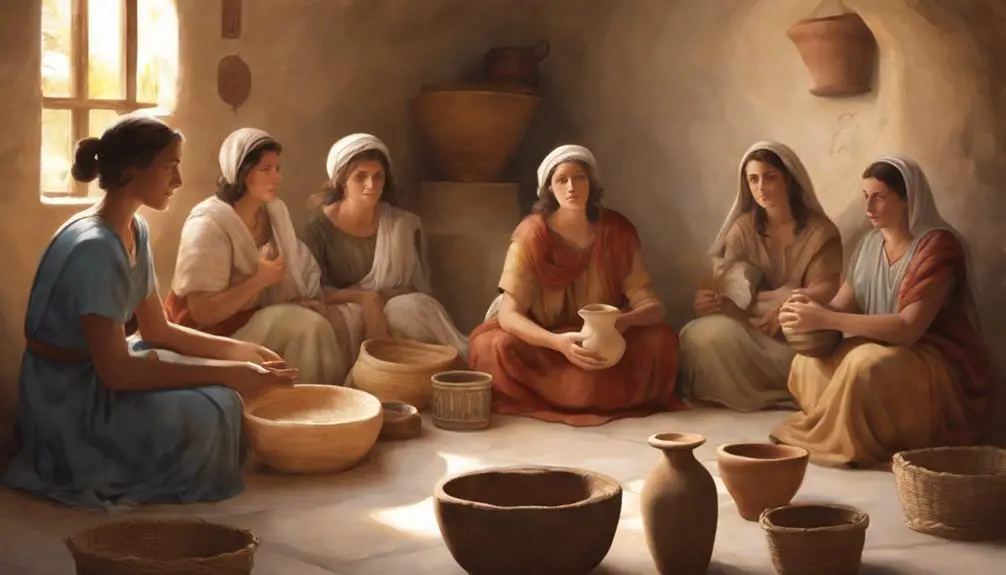Spotlighting Apphia's enigmatic presence in the Bible, uncovering the untold influence of early Christian women.

Apphia in the Bible
Amidst the ancient anecdotes and allegories, you've likely lingered over many names, but Apphia's mention might have merited merely a moment. This singular nod to her in the New Testament, specifically in the letter to Philemon, leaves a lot to unpack about her identity, role, and influence in early Christian communities.
You may find yourself wondering about the significance of her brief biblical cameo. Why does her name endure in religious texts, and what can her story tell us about the status and contribution of women in the nascent Church?
Unraveling the layers behind Apphia's mention could cast a new light on familiar narratives, suggesting there's more to explore about her legacy and the early Christian women like her.
Key Takeaways
- Apphia is mentioned in the New Testament, reflecting her importance in early Christian communities.
- Speculations about her being Philemon's wife or sister highlight her possible familial connections.
- Her story challenges traditional views on female roles in the ancient church, showing women's active participation.
- Apphia's inclusion alongside prominent figures underlines her significant influence within the Christian community.
The Singular Mention of Apphia

In the New Testament of the Bible, Apphia is mentioned only once, in the Epistle to Philemon, highlighting her unique but significant role in early Christian communities. This singular reference has sparked curiosity and debate among scholars and believers alike, leading to a deeper examination of her place within the tapestry of biblical narratives. The inclusion of Apphia, alongside Philemon and Archippus, suggests a familial or close community relationship, potentially indicative of her influential status within the house church that met in Philemon's home.
Delving into Apphia's lineage, there's scant direct information available, leading to speculation based on the context and customs of the time. Her mention alongside prominent figures in the Christian community suggests she held a position of respect and authority. This has led scholars to infer aspects of her background, including the possibility of her being Philemon's wife or sister, which would have implications for understanding the social and religious dynamics of early Christian groups.
Textual variations in ancient manuscripts add another layer of complexity to understanding Apphia's role. Differences in spelling and grammar, though subtle, may influence the interpretation of her relationship to the other individuals mentioned and her overall significance. These variations require careful consideration, as they can alter the perception of her status and influence within the community.
Analyzing Apphia's singular mention through the lenses of her possible lineage and textual variations provides a nuanced understanding of her role. It emphasizes the importance of even the briefest mentions in biblical texts, offering insights into the structure and dynamics of early Christian communities.
Deciphering Apphia's Identity

Deciphering Apphia's identity requires a thorough analysis of her brief mention in the New Testament, shedding light on her role within the early Christian community. Her name surfaces in a context that suggests she held a significant position, yet the specifics of her background and family ties remain a subject of scholarly debate. To understand Apphia's place in the tapestry of early Christianity, you must delve into the social and historical context of her time.
Apphia's background, though not explicitly detailed in the scriptures, can be pieced together through the lens of early Christian societal norms. The mention of her alongside figures like Philemon and Archippus hints at a possible familial connection or a prominent role in the household that hosted church gatherings. This implies that Apphia wasn't merely a passive bystander but an active participant in the fledgling Christian community.
Family ties in the early Christian era weren't just biological but also spiritual. The assembly of believers often referred to each other as brothers and sisters, underscoring the close-knit nature of these early communities. Given Apphia's mention with notable Christian figures, it's plausible to infer that her inclusion in the greeting denotes a status of respect and leadership within the group.
Apphia and Early Christian Women

Apphia's story illuminates the roles and recognition of early Christian women within their communities, challenging us to rethink traditional narratives about female participation in the ancient church. When you delve into the context of Apphia's mention in the New Testament, you uncover a broader, more inclusive picture of women's roles in early Christian gatherings. This perspective not only enriches our understanding of the early church but also highlights how women like Apphia were integral to its foundational structure.
The inclusion of women in pivotal roles wasn't merely a token gesture but a reflection of the early Christian ethos of equality and fellowship. This is evident in:
- Women's active participation in house churches: Unlike the public temples of the time, early Christian gatherings often took place in homes, spaces where women could have and often did hold positions of influence and leadership.
- The acknowledgment of women as co-laborers: References to women in early Christian texts, including Apphia, underscore their vital contributions to the spread and sustenance of the faith.
- The shift towards a more inclusive community: The early church's practice of including women in its assemblies and decision-making processes marked a significant departure from the prevailing social norms of the time.
This analysis compels us to view Apphia not as an outlier but as representative of the broader participation of women in early Christian communities. It's an invitation to appreciate the depth and diversity of women's roles in the nascent church and to recognize their enduring impact on Christian gatherings and leadership structures.
The Letter to Philemon Explored

Exploring the Letter to Philemon offers a unique lens through which we can further understand the significant roles women like Apphia played in the early Christian community. Authored by Paul, this epistle isn't merely a personal letter but a profound theological document that sheds light on early Christian ethics, social norms, and the role of women in the church.
Paul's authorship is crucial; he's not just addressing Philemon, but also Apphia and the church that meets in their house. By including Apphia, Paul implicitly acknowledges her influence and status within the community. This inclusion is a testament to the indispensable roles women held in the early church, often as co-laborers in the gospel.
The letter's central figure, the slave Onesimus, is where Paul's theological and ethical teachings converge. Paul appeals to Philemon not on the basis of authority but love, urging him to welcome Onesimus back not as a slave but as a brother in Christ. This request challenges the existing social norms and illustrates the transformative power of the gospel on societal relationships.
Paul's tactful approach, addressing both Philemon and Apphia, signifies the collective responsibility of the Christian community in reconciling and restoring broken relationships. It underscores the idea that in Christ, there's neither slave nor free, male nor female, but all are one.
In essence, the Letter to Philemon, through Paul's authorship and the narrative of the slave Onesimus, provides a compelling glimpse into the early Christian ethos, particularly highlighting the significant, yet often overlooked, roles women like Apphia played in shaping the fledgling Christian community.
Apphia's Legacy and Significance

Delving into the legacy and significance of Apphia reveals her pivotal role in the early Christian community, illustrating how women's contributions were crucial yet often underestimated. This exploration not only highlights Apphia's influence but also casts a broader light on the roles biblical women played in shaping the nascent Christian faith.
Apphia's mention in the New Testament, though brief, is packed with implications about her status and influence within the early church. Understanding her significance requires recognizing the nuanced ways in which women contributed to the Christian movement, often without the explicit titles or recognition afforded to their male counterparts.
- Leadership Role: Apphia likely held a leadership position within the Phrygian church. Her inclusion in Paul's letter to Philemon suggests she was a key figure, underscoring the vital roles women played in early Christian communities.
- Mentorship and Influence: Apphia's influence extended beyond mere administrative duties. She likely served as a mentor and spiritual guide, contributing to the spread and consolidation of Christian teachings.
- A Model of Faith: For contemporary Christians, Apphia represents a model of steadfast faith and dedication. Her story encourages believers to recognize and value the diverse contributions of women in the church.
Apphia's legacy, though encapsulated in a single biblical verse, speaks volumes about the intricate dynamics of early Christian communities and the indispensable role of women within them. By appreciating Apphia's contribution, you gain a deeper understanding of the foundational principles that shaped Christianity and the unsung heroes who helped pave its way.
Frequently Asked Questions
How Is Apphia's Name Pronounced, and Does Its Pronunciation Vary Across Different Cultures or Languages?
You're curious about how to pronounce 'Apphia' and whether its pronunciation changes across cultures or languages.
The linguistic origins of a name often influence its pronunciation. Pronunciation guides suggest that in English, it's typically pronounced as 'Ap-fee-ah.' However, this can vary widely due to regional accents and linguistic traditions.
For instance, in Greek, it might sound more like 'Ap-fee-a,' showcasing how cultural nuances significantly affect the pronunciation of names.
Are There Any Contemporary Artworks, Music, or Literature That Feature Apphia as a Central Figure or Inspiration?
Ever wondered about Apphia's influence in contemporary art?
It's fascinating how artistic interpretations breathe new life into historical figures.
While not widely mainstream, there are select pieces of art, music, and literature where Apphia serves as a central muse or inspiration.
These works often explore themes of faith, loyalty, and resilience, offering fresh perspectives on her story.
They underscore the enduring impact of her character across different creative domains.
How Do Different Christian Denominations View and Interpret Apphia's Role and Mention in the Bible Today?
You'll find that Apphia's significance in Christian texts varies widely among denominations. Some see her as a pivotal, though brief, figure demonstrating early Christian community roles. Others might interpret her mention more symbolically, reflecting broader themes of faith and fellowship.
Denominational perspectives can shape how you understand her role, with some emphasizing her leadership within the church, while others view her as a testament to the inclusivity of early Christian communities.
Has Archaeological Evidence Ever Been Found That Directly or Indirectly Supports the Historical Existence of Apphia?
No, you haven't found a direct link or archaeological evidence, like Apphia's tomb or inscriptions that conclusively support her historical existence. Despite extensive excavations and inscription analysis, the search yields more questions than answers.
However, this doesn't diminish her significance or the quest for understanding. Scholars continue to analyze ancient texts and artifacts, hoping to uncover clues that indirectly hint at her presence in historical records, keeping the investigation both alive and intriguing.
What Are Some Modern Movements or Organizations That Have Been Inspired by Apphia's Story or Have Chosen Her as a Patron Figure?
You're exploring how Apphia's leadership and her story have inspired modern movements and organizations, particularly those focusing on women's empowerment.
While specific groups explicitly naming Apphia as a patron are rare, her influence is felt in initiatives that champion women's roles in leadership and faith communities.
These movements draw on her example to encourage and uplift women, showing the lasting impact of her leadership qualities in today's efforts towards gender equality and empowerment.
Conclusion
So, there you have it, Apphia, a woman briefly mentioned yet profoundly impactful. Isn't it ironic? In just a few words, her legacy outshines many who've had chapters dedicated to them.
Through the lens of the Letter to Philemon, you've glimpsed early Christian dynamics and the subtle yet significant roles women like Apphia played. It's a stark reminder: in the grand narrative of history, sometimes the most fleeting mentions carry the deepest echoes.
Her significance, though subtly penned, is undeniably monumental.



Sign up